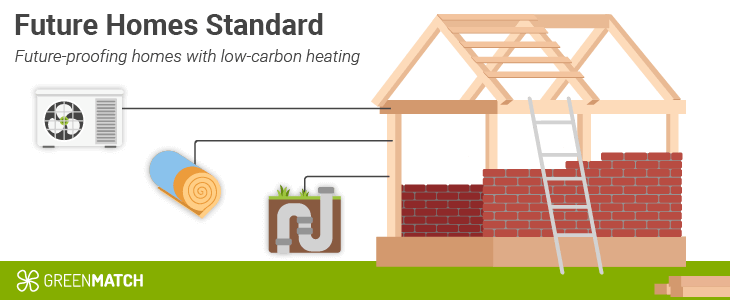- GreenMatch
- Blog
- Future Homes Standard
Future Homes Standard - Setting Targets for Energy Efficiency


What is the Future Homes Standard?
The UK government will introduce a commitment called Future Homes Standard to ensure newly built homes are future-proofed with low carbon,energy efficient heating systems, such as heat pumps. There are measures taken as a roadmap towards the Future Homes Standard that aims to reduce the energy usage and greenhouse emissions of new buildings.
According to the 2019 consultation, 20% of greenhouse gas emissions are contributed by both new and existing homes in the UK. Future Homes Standard is said to complement the Building Regulations which aims to improve energy efficiency in newly built homes from 2025 onwards. This standard will apply to newly built homes in England.
The Future Homes Standard Consultation
The first consultation of Future Homes Standard ran from October 2019 to February 2020, and proposed an upgraded standard for new smart homes of the future. In order to meet the commitment of Future Home Standard consultation from 2025, the heating industry needs to be equipped with necessary practices.
The consultation was set in two parts. Part L (Conservation of fuel and power) and Part F(Ventilation) of the Building Regulations to improve energy efficiency of new homes. In 2021 January, the government issued its response and announced a confirmation that new homes need to be equipped with low carbon heating solutions by 2025. The government is focussing on increasing heat pump installations in both existing and new homes, with a goal of installing 600,000 heat pumps by 2028, as part of the Government's Green plan.
What Does This Mean for New and Existing Homes
New homes from 2025 will move towards having low carbon heating systems installed in them. By embracing low carbon technologies, homes can become more energy efficient and contribute to the bigger goal of achieving Net Zero 2050.
While newly built homes in the future will have low carbon heating systems such as air source heating, existing homes are being given schemes and incentives to switch to energy efficient systems that will not only save money on electricity bills over time, but also enable homeowners to have a renewable lifestyle.
According to the government, existing homes can apply for new measures such as insulation improvements such as double glazing windows and doors, which will also significantly improve the energy efficiency and reduce energy consumption.
What Can We Expect Going Forward?
The goal moving forward is to ensure that new homes are well equipped with low carbon heating systems, thereby eliminating the need to be retrofitted in the future. Based on the IEA report, no new gas boilers are to be installed by 2025, and this aligns with the goals of Future Homes Standard.
The International Energy Agency, in their latest special report, stresses that no new gas boilers should be sold after 2025 if Net Zero targets need to be achieved by 2050. Heat pumps are expected to be a better, low-carbon alternative to heating homes in the foreseeable future.
There are big hopes for the Future Homes Standard to make England homes energy efficient, which will benefit homeowners with their energy costs and also build a better environment for future houses.
The Building Regulations will be updated later this year to ensure that new homes from 2022 will produce upto 31% lower emissions compared to the levels currently. In 2023 we can expect that the government will update the technical aspects of the Future Homes Standard before it comes into force in 2025.
Grants That Promote Low Carbon Heating
To achieve the Net Zero target by 2050, the UK government has been introducing schemes and incentives to enable homeowners to make the transition to greener living. It is necessary to phase out the dependency on fossil fuels to heat homes, and banning gas boilers from 2025 was a good proposal, from IEA, towards reducing carbon footprint.
Schemes and grants such as the Green Homes Grants in the past, and Renewable Heat Incentive (RHI) are good examples of incentivising homeowners to make long term investment towards energy efficient systems.
RHI, which is still open to new applications, is a government scheme that works as a financial support program for homes that have installed low carbon heating systems. Households can earn money through annual payments that run for seven years.
On 1 April 2021, changes to the RHI scheme have come into force. Applicants who commissioned their eligible heating system on or after 1 March 2019 can now apply for accreditation to the RHI scheme.
Applications that have been unable to comply with the 12-month submission rule can now re-apply until the scheme ends on 31 March 2022.
Read more on OFGEM site.
In the coming months and years we can also expect a Heat and Buildings Strategy which aims to help homeowners to emit lower emissions by switching to low carbon heating technologies such as solar thermal systems, biomass boilers and heat pumps.
There has also been an announcement regarding the Clean Heat Grant that is to come into action in 2022, which is going to replace the RHI, once the scheme comes to an end.

Valli has been writing well researched articles about renewable energy, sustainability and green technologies for GreenMatch since 2017. Her work has been published in various media such as Entrepreneur, Business Insider, Canadian Geographic, uSwitch, and eCycle.
We strive to connect our customers with the right product and supplier. Would you like to be part of GreenMatch?

